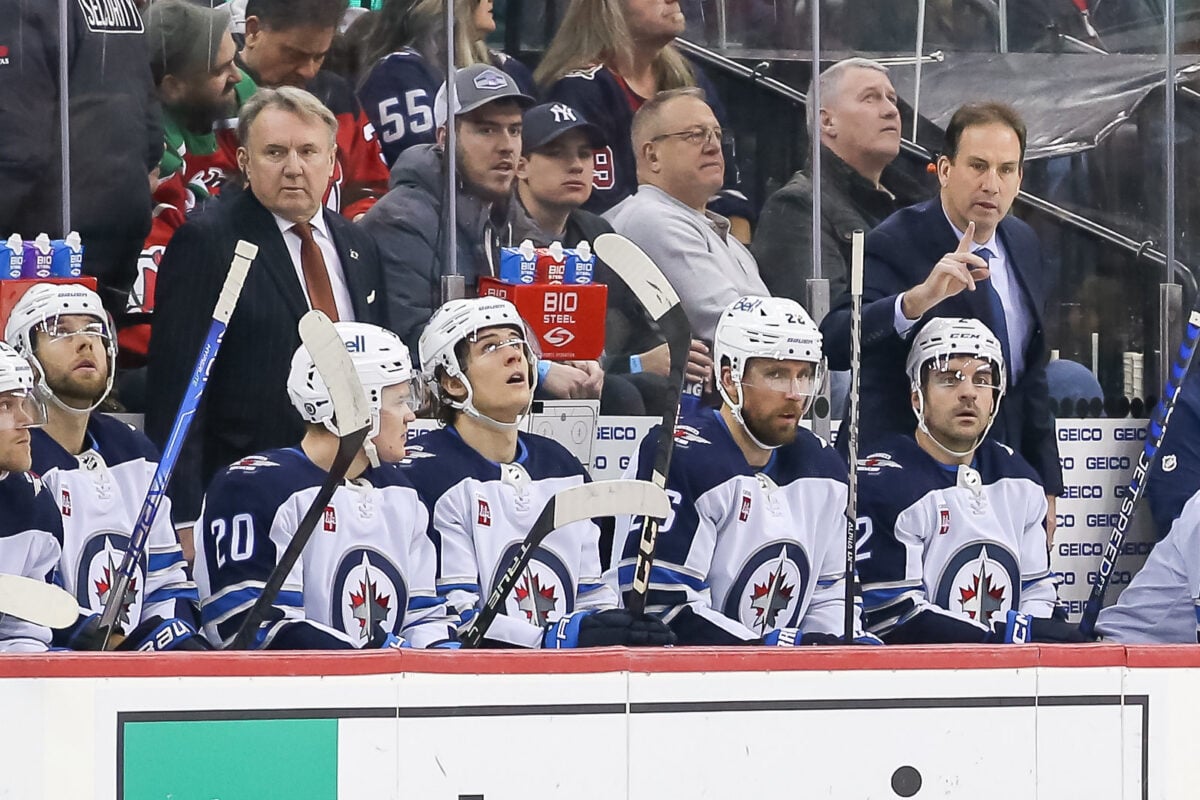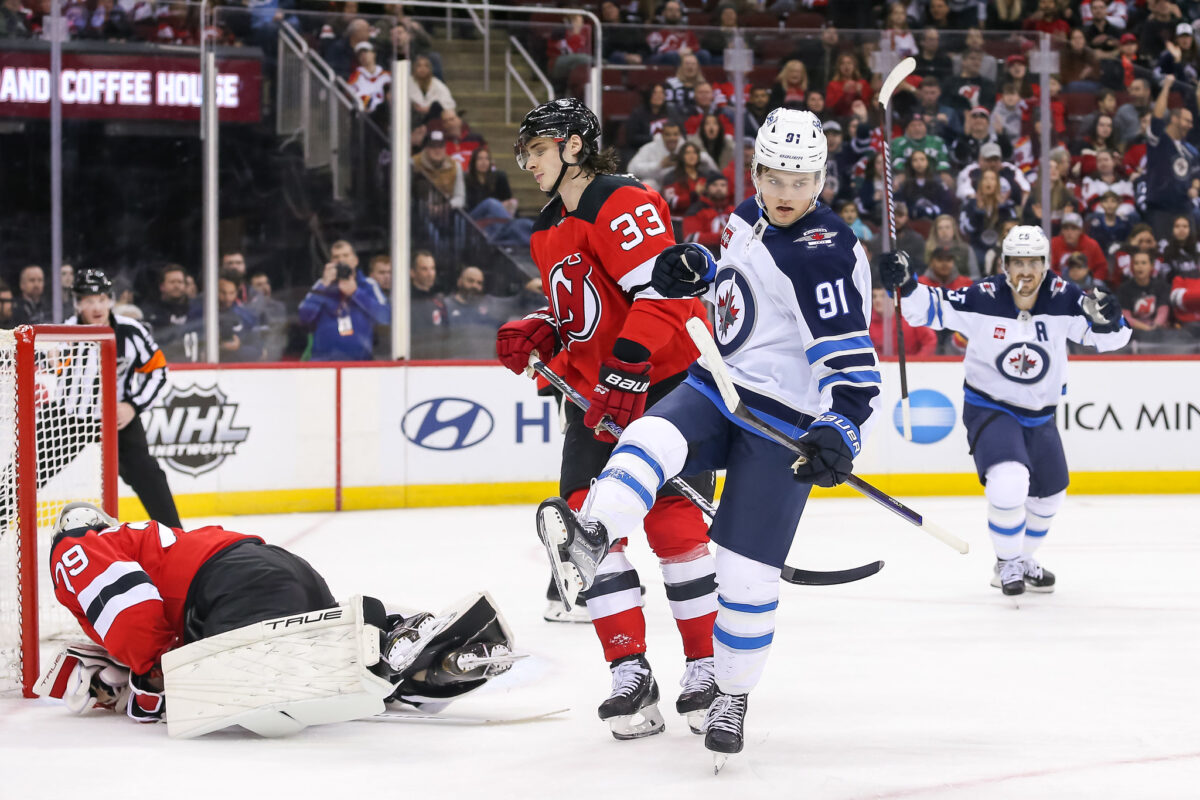The Winnipeg Jets are still in a battle for a playoff spot, but would the team making the postseason actually be good for the franchise’s trajectory?
Money Matters — But How Much?
From a monetary standpoint, it’s obvious True North Sports & Entertainment wants the Jets to qualify. Playoff games mean additional ticket revenue, merchandise sales, and thousands of people in the streets of downtown for the always-popular Whiteout street parties.
The deeper the Jets go in the playoffs, the deeper True North’s coffers will get. True North pulled in $149 million in revenue in 2022 and had a $22 million operating income, according to Forbes, and that’s without any playoff-game revenue. That was a massive rebound from 2021, where they generated just $68 million and had a negative $46 million operating income due to a 2020-21 season played without fans in attendance.

Sure, True North needs to be profitable to keep the Jets viable. No one’s begrudging them that, and no Jets fan wants to see their team leave town again. But when you look past the money to the long-term on-ice results — you know, winning, the thing sports franchises exist to do — whether it’s better for the Jets to qualify or miss is a bit murky.
Jets Don’t Seem Poised for Long Run, If They Make It
You know the saying “it’s better to have loved and lost than never to have loved at all?” You can argue if this is true, but it’s generally accepted as a solid piece of folk wisdom. It may not, though, be transferrable to playoff berths.
“Is it better to have made the playoffs and lost in the first round than to not have made the playoffs at all?” Perhaps not.
If you asked most pundits three months ago if the Jets were going to make some serious noise in the playoffs, most would have given a resounding “yes.” Under new head coach Rick Bowness, the team had an exceptionally strong first half and it seemed a lot of the issues with effort levels and egos had been sorted out. On Jan. 15, they were 29-14-1, had banded together through injury adversity, and the sky, as they say, seemed to be the limit as they sat near the top of the Central Division and even the Western Conference.

If you asked most pundits now whether the Jets are going to make serious noise in the playoffs, you’d get a much more muted response. For one reason or another, since mid-January, the team has stopped listening to Bowness, even though they saw how successful they can be when playing his way. Too many of the core scorers have been silent too often, the power play has been completely impotent, the over-reliance on Connor Hellebuyck has reemerged, and the dedication of some so-called leaders has once again fallen into question.
Related: Jets’ Scheifele Has Quietly Quit on His Team; Trade Request Coming?
The Jets most recently blew a chance in their most pivotal game of the year to go four points up on the Calgary Flames, their closest competitor for the final Western Conference Wild Card spot. Despite the Flames having played the night before, they triumphed 3-1 over a rested Jets’ squad and now each club has 89 points (with the Jets holding a game in hand.) The Nashville Predators are still in the hunt too, three points behind.
Teams don’t necessarily have to be a high seed to have playoff success — the 2011-12 Los Angeles Kings, for example, finished eighth in the Western Conference and won it all — but teams do need to go into the playoffs with some momentum. With the loss to the Flames, the Jets are just 11-13-2 since the All-Star Break.
The Jets will sometimes look like a true contender, as they did with back-to-back six-goal games against the Detroit Red Wings and New Jersey Devils last weekend. But at this point, everyone know what and who the Jets’ “difference makers” are: an extremely skilled, but fragile bunch who have trouble feeling motivated to win and do not possess strength of character to consistently commit to working hard.
Playoff Berth Could Be Used as an Excuse to Stick to the Status Quo
There’s potential that if the Jets make the playoffs, even if they don’t go far, True North will use it as a justification for sticking to the status quo. “Everything’s fine, nothing to see here. We battled hard and made the playoffs, so we’re staying the course.”
That’s not acceptable, as there are systematic flaws preventing the Jets from reaching the next level. The teams GM Kevin Cheveldayoff has assembled have won just three playoff series in 11 seasons, and long-gone is the “honeymoon era” where Winnipeggers were just happy to have a team, packed the arena every night, and waited for season tickets for years.
This season, despite not having any COVID-19 vaccination requirements for entry and the Jets marketing quarter-season packs and promotional prices quite aggressively, there are an average of about 1,000 empty seats per night in Canada Life Centre.
Rebuild Happening Whether Cheveldayoff Likes It Or Not
Darren Dreger reported already that Cheveldayoff — who has been GM since relocation and is ultimately responsible for the on-ice product — is shying away from a rebuild. Sadly, this will only delay the inevitable as the team’s one and two centres will likely be gone soon.
Try as he has been, Cheveldayoff is unlikely to convince Pierre-Luc Dubois to sign long term in Winnipeg. Dubois, an unrestricted free agent after next season, put the organization in a bind last summer with his comments that he wants to play for the Montreal Canadiens, and that still seems his eventual destination.
Mark Scheifele, also a UFA after next season, had a brief resurgence to a two-way player in the first half but is now back to his old ways. Once again, the Jets’ first-ever draft pick seems like he has one foot out the door.

Cheveldayoff, if he keeps his job, has to try to trade both this offseason. Hanging onto them and losing them for nothing next summer would be disastrous. Speaking of next summer, that’s when Blake Wheeler, who is still being used in a top-six role despite being on his last legs, will be gone as well.
If Dubois and Scheifele are traded or leave, you can count Hellebuyck gone too. The star goaltender, yet another UFA after next season, made it clear a few months back he has but one goal: winning a Stanley Cup. He would have no interest in sticking around for a rebuild and could write his own ticket with any one of a number of contenders.
“Mushy Middle” is the Worst Place to Be
Say what you want about tanking, at least it’s a direction and a plan. Going through lean times is hard, but is ultimately necessary to develop a strong, hard-working, consistent core that can truly contend for a long period.

Take the Chicago Blackhawks as an example. The Blackhawks won Stanley Cups in 2010, 2013, and 2015, but then, the core that led the dynastic run got old. For a time, their front office failed to acknowledge that, and as a result the team spent three seasons the “mushy middle,” missing the playoffs twice and squeaking in once but losing in the first round.
Finally, over the past two years and last summer especially, their front office faced up to the need for a scorched-earth rebuild and began to sell off assets and acquire (and play) prospects. They’re not a good team yet, but will be again a few seasons down the line.
Being in that mushy middle — finishing between 15th and 20th and either losing in the first round or just missing the playoffs — prevents teams from amassing top draft selections. It is the surest way to alienate fans and remain in the swamp of irrelevance.
The Jets can avoid that by rebuilding around Kyle Connor, Nikolaj Ehlers, and Cole Perfetti, but it may take missing the playoffs this season for them to commit to doing what needs to be done.